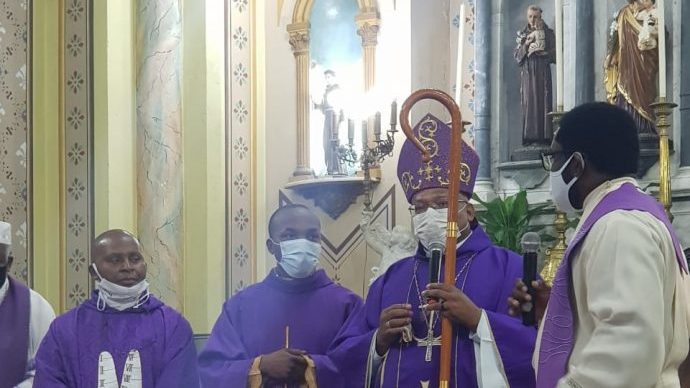At the end of February, the Archdiocese of São Paulo established a personal chaplaincy for Nigerians, who constitute one of the largest African communities in Brazil’s biggest city.
Named after Saint Josephine Bakhita, it will serve immigrants and refugees who have often felt estranged from a Church where they say they couldn’t feel at home.
“Most Nigerians don’t speak Portuguese and can’t understand anything during Mass. So, many of them end up joining a Neo-Pentecostal church in which services are held in English,” explained Ikenna Kingsley Ojukwu, a Catholic layman who was crucial in the formation of the chaplaincy.
Ojukwu had seen the need to build a Catholic community for Nigerians in São Paulo when he traveled to his homeland in 2019 to visit his relatives. In Anambra State, he met Father Modestus Oguchi Aloize and asked him to visit Brazil during his next vacation.
“When I came to São Paulo, I didn’t have any plan to work with the Nigerians here. But I heard them continually complaining about the linguistic barriers they faced in church. Many people asked me to celebrate,” Aloize told Crux.
That’s when they decided to talk to Auxiliary Bishop Eduardo Vieira. Shortly afterward, Cardinal Odilo Scherer, the Archbishop of São Paulo, authorized the establishment of a chaplaincy. Celebrations are for the time being taking place at the Brotherhood of the Black Men of the Rosary church, which owned by a centuries-old fraternity founded by slaves during the colonial era.
Most of the 3,300 Nigerians living in São Paulo are Catholic men who left their country in search of a better life in Brazil. They usually come from the predominantly Christian southeast part of the country, but the community also has a significant number of Muslims, who come from northern Nigeria. Some of them eventually bring their families, but the majority live in the city alone and send money to their wives.
Loneliness in a foreign country and the cultural obstacles to integrate in the Brazilian society sometimes are accompanied by the scars of traumatic experiences in Nigeria.
“Over the years, we have welcomed a number of Catholic Nigerians who had suffered persecution from Muslims in their country,” said Father Paolo Parise, the coordinator of Mission Peace, a Scalabrinian center that provides temporary shelter for immigrants and refugees in São Paulo.
According to the charity organization International Christian Concern (ICC), between 50,000 and 70,000 Christians have been killed in the last decade in Nigeria. The ICC states that most attacks are perpetrated by the terrorist group Boko Haram and by militants of Fulani ethnicity in the “Middle Belt” of the country, between the predominantly Christian south and predominantly Muslim north in the country.
Mission Peace welcomes Nigerians from all religions in São Paulo. “But historically two thirds of the Nigerians who come to us are Christians,” Parise said.
Another common issue involving Nigerians in Brazil is police profiling, especially at the airport. “There are Nigerian mafias involved in drug and human trafficking in Brazil. Unfortunately, some of the Nigerians face prejudice from the police,” he added.
Such hardships don’t change the desire that most members of the community have to be involved in church life. Ojukwu explained that most Catholic Nigerians are more observant churchgoers than the Catholics from Brazil, where Catholicism is the predominant religion but active participation in the sacraments is low. That’s why the difficulty in getting involved in church has been a cause of anguish for many.
“During confession, some Nigerians told me they hadn’t received the sacraments for five, 10, or even 13 years. And they thanked me for bringing God back to them,” Aloize said.
Festus Ogbogu Okoye moved from Nigeria to São Paulo in 2001. Profoundly Catholic – he had started to study to be a priest in his home country – he never ceased to go to church in Brazil, despite the linguistic obstacles.
“The blessings are the same, but it’s a different experience. When the Mass is your language, you feel at home,” he told Crux.
Mission Peace promotes Masses in English, but most of the participants are Filipino.
“English-speaking Africans sometimes attend those Masses, but it’s not only about language. There’s also the cultural aspect of the experience,” Parise said, mentioning that several Church documents emphasize the importance of national chaplaincies and parishes to keep alive the spirituality of migrant and refugee groups.
“Immigrants generally don’t identify with the territorial element of a parish. They see themselves as part of a national community,” he added.
According to Aloize, the celebration of the establishment of the chaplaincy brought together dozens of people not only from Nigeria, but also from other English-speaking African countries, like Ghana and South Africa.
“Even people from French-speaking Burkina Faso attended our Mass. They felt close to their African brothers and joined us,” he said. The growing number of attendants will probably require a larger church in the future, he added.
Vieira told Crux that the archdiocese’s main concern was to secure that São Paulo’s Nigerians could rediscover their faith and have the means to profess it.
“We believe that the Nigerian chaplaincy will also contribute to their cultural and political life in Brazil. That’s our great desire,” the bishop said.

